
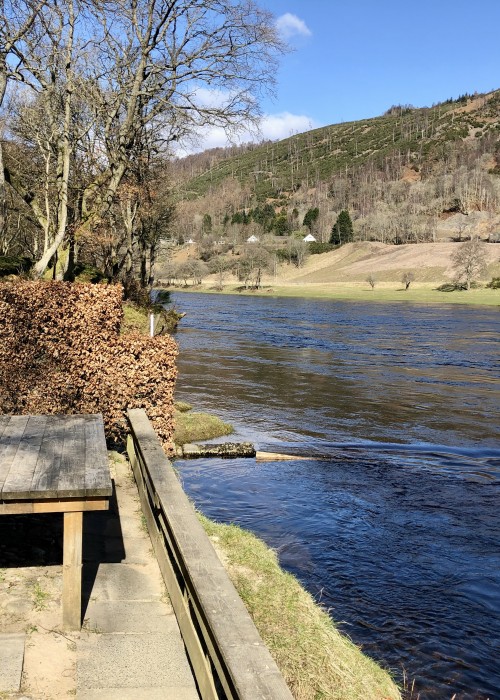
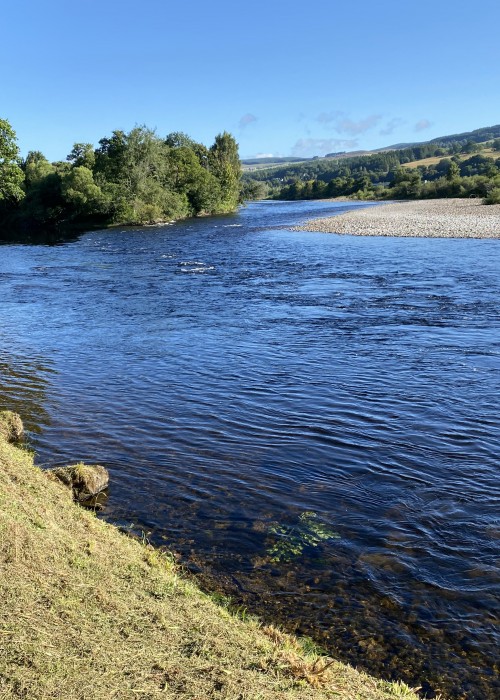
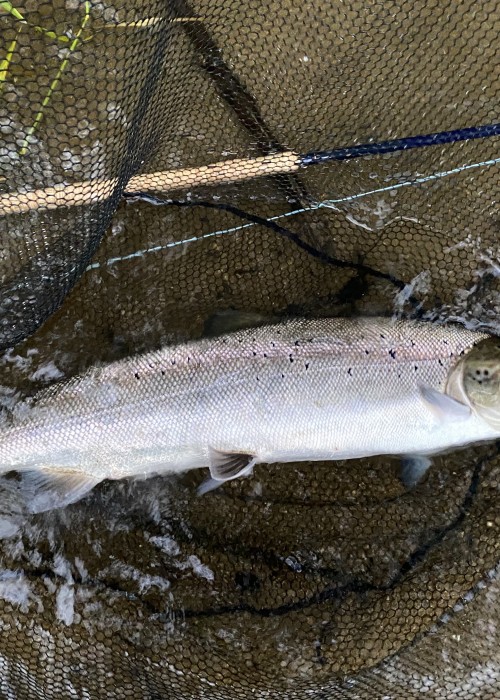
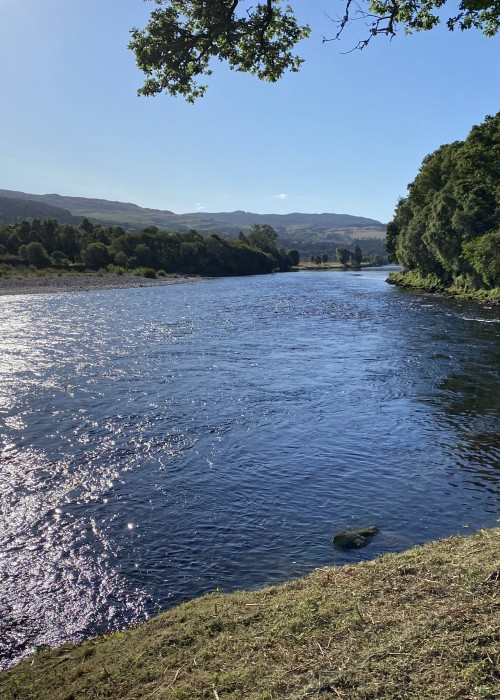
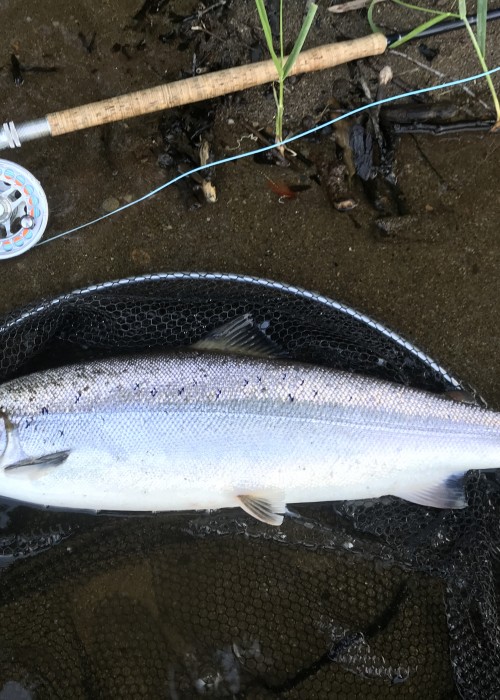
A professional Scottish salmon fishing guide's assessment of the current wild Atlantic salmon stocks present in the Scottish salmon rivers.
This is a truly amazing subject to dwell on as there's much more to it than just observing the steady decline in Atlantic salmon stocks on most Northern Hemisphere rivers over the last 4 decades. Scotland is one such nation that appears to have experienced a significant decline in wild salmon stocks over recent decades however most of the data is built on complete guesswork and not hard factual in-river fish stock data. In fact Scottish salmon fishing must be the only £100+ million business in the world where the true stock position is and has always been completely unknown which is really quite amazing if you think about it. There are many varying and unreliable factors that go into the tallying up of annual salmon catch data in Scotland. Firstly, as there are no actual effective stock counting mechanisms in place to know exactly how many salmon are present in the vast majority of Scottish salmon rivers the whole industry leans on angler's rod catches for its data. Obviously then a river catch book is only as good as the number of salmon anglers who show up each day and that goes one step further as it also then depends on the level of competance the salmon anglers have for effectively fishing the river. From personal observations over the last 2 decades I'd say that less than 10% of visiting salmon fishers are of true 'expert' status which isn't a high enough percentage to maintain or bolster historic catch records. In previous decades I witnessed a far higher 'expert' status level from salmon fishers (& professional career ghillies) on the River Tay and other Scottish rivers.
Other major factors that influence salmon catch statistics are based on weather & water conditions. Any really hot Summer years with low warm water that extend into the early Autumn months are never going to set the 'heather on fire' for salmon catches as salmon & salmon anglers are both conditioned to not cooperate too readily during such conditions unless you're a top professional salmon guide or salmon fisher who understands exactly how to target deep lying educated resident salmon that are holding up in the deep river pools which is where you'll mainly locate resident salmon during such water conditions. In recent years (and in years gone by) we've experienced hot summers where few salmon get caught then mysteriously following the first heavy rainfall period most salmon beats that are effectively fished have fantastic salmon catches. In my lifetime this scenario has never been any different except decades ago no-one was harping on about climate change and hot Summers with low warm water were just accepted as normal Summer fishing conditions.
There are areas of the world such as Iceland (as a leading global example) that have taken their wild salmon resource and developed the concept of smolt ranching where juvenile salmon that would otherwise mostly not survive the perils of early river life are reared in a secure natural environment until they are of an 'ocean ready' smolt size to then be released. This age old concept is nothing new and with absolute certainty it increases the sea-ready juvenile salmon output from any river therefore maximising the chances of more returning adult salmon. This works very well in Iceland which has a thriving 'rod & line' salmon fishing industry but has not yet been properly adopted (or often even positively considered in Scotland). One of the unqualified reasons for not following the Icelandic initiative in Scotland is that Iceland 'uniquely' had volcanic sedimentation pollution issues which silted up their rivers spawning gravels but the real truth is that Scottish rivers have had much more siltation added over the last 50+ years with the cumulative effects of hydro dams that block the natural movement of salmon spawning gravels (making old unreplenished gravel beds prone to siltation) in addition to huge-scale commercial forestation hill drainage which has created massive siltation displacement issues which seriously impacts Scottish riverbeds so there's really no argument there for not assisting the wild Scottish salmon stocks via 'wild simulated & genetically intact' smolt ranching projects or at least properly trialling this 'logical' concept for proper large scale roll out evaluation. An abundance of salmon benefits the entire ecosystem in addition to many other creatures that depend on the salmon stocks not to mention the benefit to the entire Scottish rural economy and often during 'off-peak' tourist periods of the year.
The other reason often given by the fishery management organisations of Scotland for not adopting large scale smolt ranching initiatives is that there's no point setting up such projects as the huge losses occur at sea. Yes, I agree that the value in a wild salmon makes them of interest to commercial fishing enterprise (salmon DNA already discovered in commercial pelagic fishing vessels) whether these operators are specifically targeting the known oceanic migration routes (that exact migration route information was naively put into the public domain 20 years ago!) or whether Scottish juvenile smolts are accidentally getting hoovered up by commercial enterprize as by-catch of other targeted species. So with the milions of pounds collected annually by fishery boards and spent on less meaningful areas of river management I'm of the firm opinion that this money should be funding fishery patrol vessels to intervene with any vessels that look suspicious or are operating within known salmon migration routes between the Scottish coast lines and the salmon's feeding grounds off Greenland & the Faroes Isles. I'm also certain that with all of the vessel satellite tracking systems in place today this essential salmon stock oceanic protection concept could easily be funded and made effective.
Salmon fisher expectations when they go salmon fishing is often much higher than what reality dictates. This is the side of the business that is important to understand as if a new or inexperienced salmon fisher turns up on a Scottish river and doesn't see or catch a salmon in the first hour or two they'll then make the incorrect assumption that there are no salmon to be caught making them quit or at least making their heads go down. Catching salmon on most rivers takes skill & patience and this is what makes the personal reward so satisfying when an angler is successful. I think sometimes that if stocks were too high much of the challenge would disappear and I remember in the 70's most Tay salmon beats I frequented would unlikely fish after lunch as many salmon were caught in the morning and there was no need to fish any longer! I think as passionate salmon anglers we work with what we've got and treasure the moments of brilliance when a salmon takes your fly as there's no point dwelling on the easy fixes for additional wild salmon stocks as I've watched this 'generally ineffective' approach from the management of Scotland's fisheries and all the illogical scientific smokescreening distractions for 20+ years and never once have I felt inspired by any of their actions so that's unlikely going to ever change unless big changes are made within Scottish salmon fishery management (including oceanic migration route flight path security) to ensure better runs of returning adult salmon. Currently, Scotland's wild salmon fishing asset is worth £100+ million to the Scottish economy each year however there's no doubt there's a billion pound potential if managed more effectively.
Catching a salmon is a fantastic experience and especially when stock levels are lower as that really seperates the 'men from the boys' as far as tactical fishing thoughts go. When golfers play a round of golf they don't always hit a hole in one (or a birdie) and to my mind it can often be the same with salmon fishing however there's much more excitement & satisfaction in tactfully stalking an often elusive wild survival specialist that's migrated thousands of miles back to its river of birth than firing a ball at a static hole that's marked with a flagged pin. I do however know a core team of professional Scottish salmon guides who seldom blank on the Scottish rivers during most water conditions. These guys are sub surface salmon fly swim technicians and they know more about the mainly invisible riverbed features of the salmon pools they fish than their eyes will show them of the riverbank terrain above the waterline! If you want a proper education on sub-surface Scottish salmon fishing effectiveness then consider booking a Scottish salmon guide to significantly enhance your chances of catching salmon in Scotland.